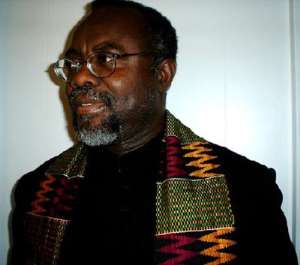
You would have thought that 60 years of postcolonial rule would have brought us, Ghanaians, into the mainstream of scientifically informed cultural knowledge and a constructive appreciation of the vicissitudes of the pulse of our environment and our ecological system in general. Alas, this story which appeared in the news some two weeks ago, titled “Funeral Held for Three Fishes to Prevent Disaster” (Kasapafmonline.com / Ghanaweb.com 5/15/17) eerily tells me that we have scarcely come as far as we need to, and have an even more dauntingly long way to go any further, before we could be aptly described as a modern people, in the culturally progressive sense of the term.
In the story alluded to above, we are told that while undertaking a clean-up exercise on the banks of the Amaano River at Nyinahin, in the Atwima-Mponua District of the Asante Region, in pretty much the same area as the native moorings of former President John Agyekum-Kufuor, the youth of the town discovered three dead fishes. We must quickly note that the clean-up exercise had been occasioned by intolerable filth that had massed up along the banks of the creek or, or small river, by global standards, of course.
What such filth means, as one commentator on the blog attached to the story aptly observed, is that the river had possibly been heavily polluted, thus causing these dead fishes to wash up the banks of the Amaano River. But the story is further complicated by the fact that traditionally it is tabooed for any Nyinahin resident to fish and consume such catch from the river. We are not told whether crabs or other river food, as in sea food, may be trapped or dredged up and consumed. Such taboo, it goes without saying, may very well have become a tradition after a tragic season of massive fish poisoning in some remote past that nobody presently living can remember any longer.
The cause of such “plague” may very well have been the result of a fisherman or woman having poisoned the river with DDT or some such lethal chemical substance, as used to happen nearly every year in one of the many towns and villages in which I lived with my parents and maternal grandparents, severally, while growing up in Ghana.
Now, what probably clearly happened is that in those days of yore – or “back in the day,” as New Yorkers are wont to say – the community and, in fact, the entire country lacked the scientific know-how to have conducted experiments on a sampling of both water and fish from the Amaano River, in order to figure out precisely what the problem was.
These days, however, there are quite a significant number of cutting-edge research institutions in the country, largely on our university campuses, whose personnel could travel the relatively short distance to Nyinahin to conduct an analysis of both water and fish from the Amaano River. We must also highlight the fact that Nyinahin is a major mining center, particularly of bauxite and gold, and has been so for decades, well before the country’s independence. Add to the foregoing the highly destructive activities of Galamseyers, and the three dead fishes turning up on the banks of the Amaano River would not seem as strange and inexplicable as it appears.
I am not hereby declaring the radical proscription of all of our customary and cultural practices; I am simply saying that the old ways of interacting with our environment may have to be radically reconfigured to make them meaningfully synch with the more scientifically informed habits of the times.
I am not the least bit scandalized by the ritualistic disposal of the carcasses of the three dead fishes at all. For, I am at heart an Akan/African traditionalist. I do libations when occasions call for the same. But I am also progressive enough to fully appreciate the practical, and even spiritual, limitations of customary praxes. I am quite certain that the formal educational levels of the Nyinahin youths involved in the widely reported ritual practice do not exceed high school. The immediate and imperative need to radically upgrading the duration and curricula contents of our formal educational system cannot be underestimated. Dr. Matthew Opoku-Prempeh, over to you.
*Visit my blog at: kwameokoampaahoofe.wordpress.com Ghanaffairs
By Kwame Okoampa-Ahoofe, Jr., Ph.D.
English Department, SUNY-Nassau
Garden City, New York
May 30, 2017
E-mail: [email protected]




 We’ll no longer tolerate your empty, unwarranted attacks – TUC blasts Prof Adei
We’ll no longer tolerate your empty, unwarranted attacks – TUC blasts Prof Adei
 Bawumia donates GHc200,000 to support Madina fire victims
Bawumia donates GHc200,000 to support Madina fire victims
 IMF to disburse US$360million third tranche to Ghana without creditors MoU
IMF to disburse US$360million third tranche to Ghana without creditors MoU
 Truck owner share insights into train collision incident
Truck owner share insights into train collision incident
 Paramount chief of Bassare Traditional Area passes on
Paramount chief of Bassare Traditional Area passes on
 Two teachers in court over alleged illegal possession of BECE papers
Two teachers in court over alleged illegal possession of BECE papers
 Sunyani: Victim allegedly shot by traditional warriors appeals for justice
Sunyani: Victim allegedly shot by traditional warriors appeals for justice
 Mahama vows to scrap teacher licensure exams, review Free SHS policy
Mahama vows to scrap teacher licensure exams, review Free SHS policy
 Government will replace burnt Madina shops with a new three-story, 120-store fac...
Government will replace burnt Madina shops with a new three-story, 120-store fac...
